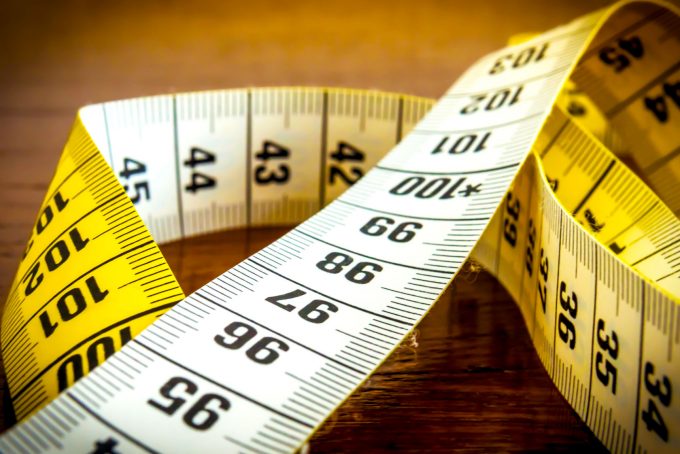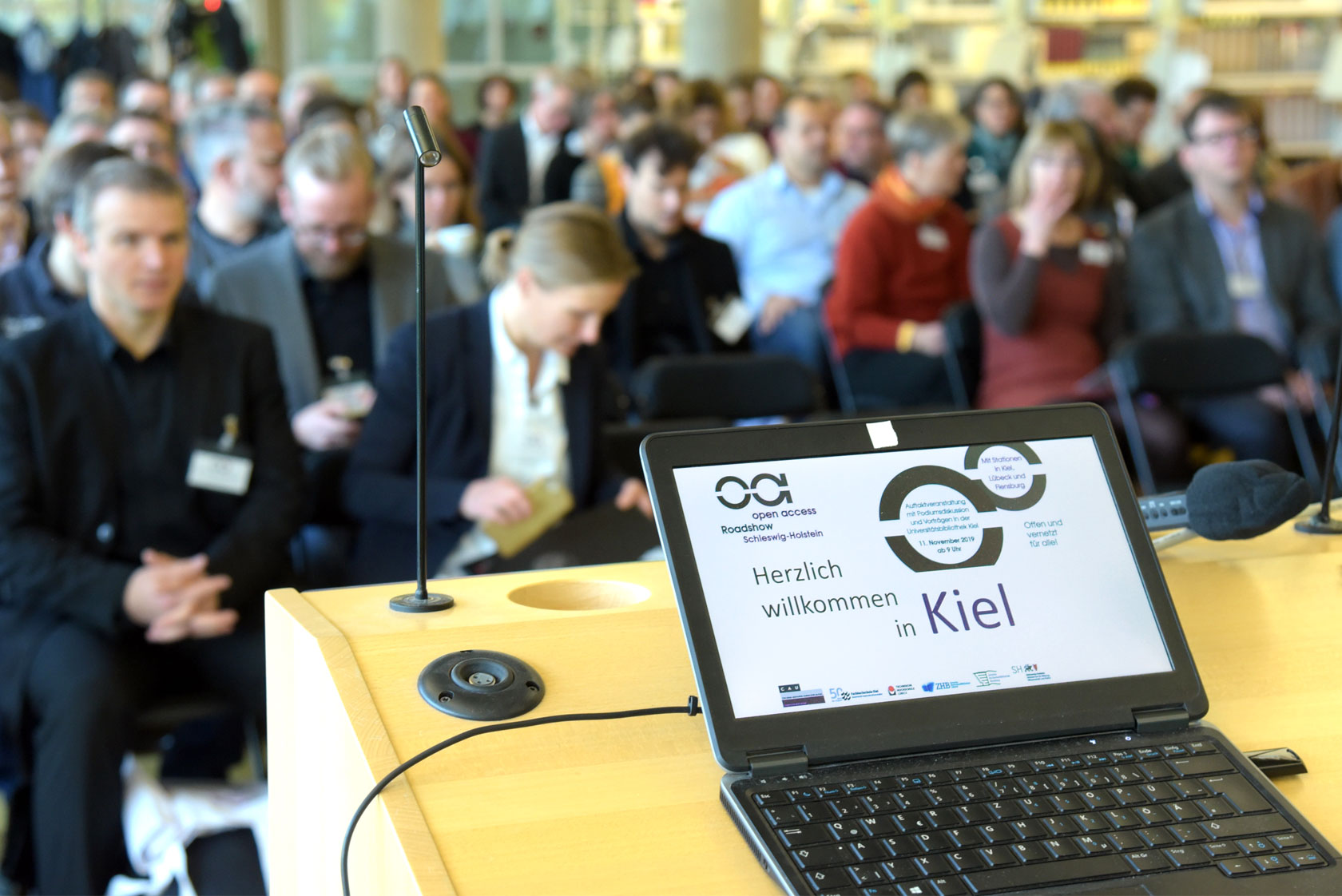
Open Access Roadshow: Open and Connected for Everyone!
"Open and connected for everyone!" With this slogan, the Schleswig-Holstein university libraries invited participants to the launch event for the first Open Access Roadshow at the University of Kiel, on 11 November 2019. The diversity of the topics ranged from open science policy strategies through to specific practical examples.
by Susanne Melchior and Olaf Siegert
(Photos: Flickr / Kieluni (CC BY-NC-SA 2.0)
The Open Access Roadshow (link in German language) is part of the open access strategy of the Ministry for Education, Science and Culture of Schleswig-Holstein. Over the course of a week, the roadshow made stops in Kiel, Lübeck and Flensburg, to offer a forum for various aspects of open access and open science. The kick-off event (link in German language) took place at Kiel University library, well visited with just under 100 registered participants.
Prof Konrad Förstner (ZB MED – German National Library of Medicine, TH Köln – Cologne University of Applied Sciences) opened the event by highlighting the significant success of preprint servers in pre-releasing papers.
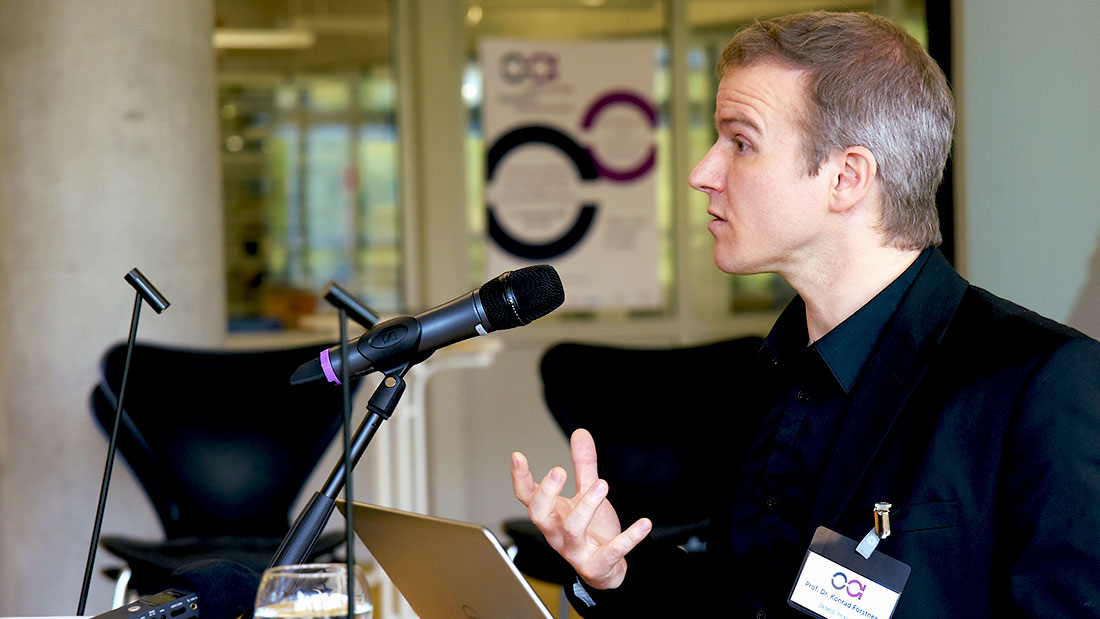
He also emphasised that it’s not a lack of technical options for open access and open science that poses an obstacle, but rather that there’s a cultural deficit in the current research landscape. Appropriate incentive systems to encourage researchers to open up their work are missing.
In her keynote speech, Kai Karin Geschuhn (Max Planck Digital Library) presented an overview on the DEAL negotiations that represent an important milestone in the standard implementation of open access as a publication model.
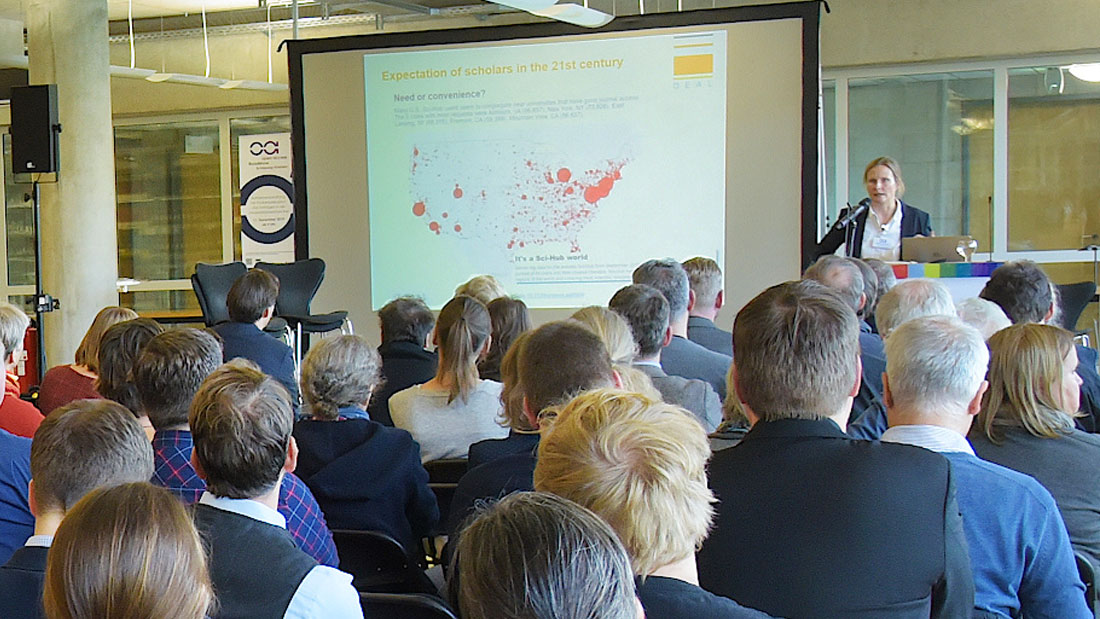
Still, 82% of the publications are coming from subscription journals. Nonetheless, there is currently an increasing desire for open access. The results of the latest ITHAKA study, a survey of researchers in the USA, showed that 64% of those surveyed wished to retain their existing journals but also wanted them to be available in an open access format.
Cultural change is the most important challenge for open access
At the podium discussion that followed, Prof Konrad Förstner (ZB MED, TH Köln), Prof Alexander Grossmann (HTWK Leipzig / Leipzig University of Applied Sciences), Dr Oliver Grundei (Ministry of Education, Science and Culture for the state of Schleswig-Holstein) and Dr Christian Heise (Open Knowledge Foundation), all shed light on current challenges concerning open access. The attitude towards open access in Germany depends strongly on the individual’s position in the scientific system. Many younger researchers in particular do not share their data in fear that others will use them to publish research results more quickly and claim the data themselves. The Ministry of Education in Schleswig-Holstein also sees the cultural change to the reputation systems of scientists as the greatest challenge.
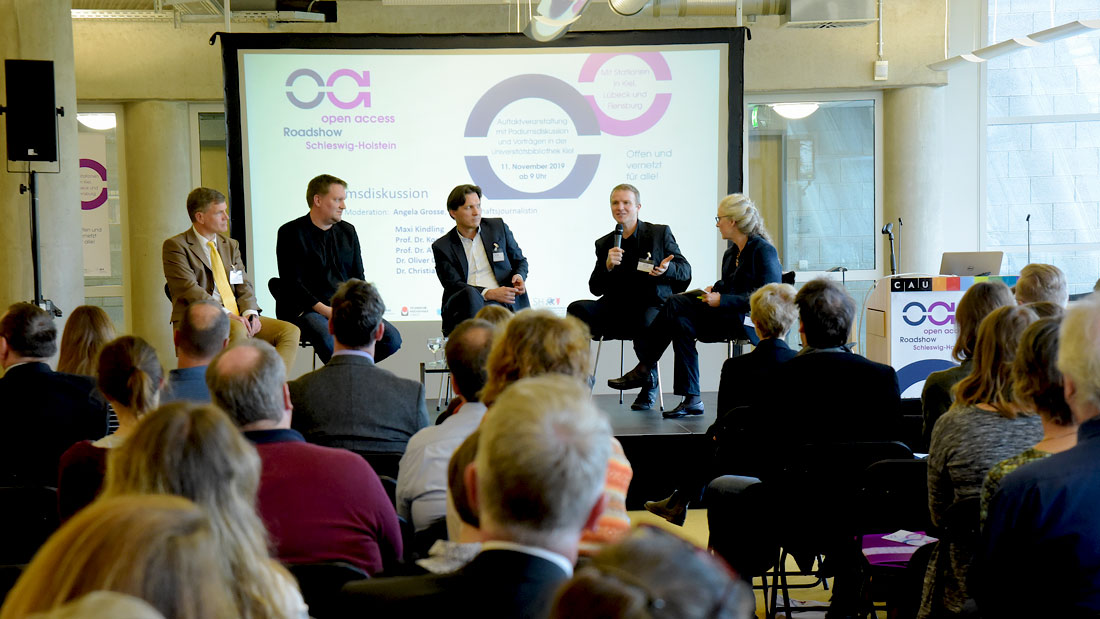
Secretary of State for Culture, Dr Grundei, emphasized that this reputation system is comparable to civil service law and that great perseverance and a high tolerance for frustration are needed to instigate a cultural change. Against this background, open science champions and best practices are important to convince researchers to open up their research. Dr Christian Heise encouraged researchers to experiment more and give new open practices a try. Openness in teaching is often underestimated. In particular, the so-called Carpentry methods, which function as targeted practical assistance for researchers, are one example of an option for libraries to promote open science and open access in a targeted manner. For the cultural change towards open science to succeed, it is very important to repeatedly link open access and open science to good scientific practice – such was the conclusion reached by the podium participants.
From the development of an OER repository to an open access strategy within a federal state – open access practices vary greatly in Germany
The second half of the launch event focused on lectures on practical examples of open access and open science from around the country. Michael Menzel (University of Tübingen) presented on subjects including the development of a central repository for open educational resources in Baden-Wuerttemberg (link in German), while Jochen Schirrwagen (University Library of Bielefeld) illustrated the concrete implementation of the first open access policy at a German university at the University of Bielefeld.
Alignment with the requirements of the scientific community
In Hamburg, the support program “Hamburg Open Science” was created based on the coalition agreement between the governing parties (Link in German) as a way to develop targeted open science support models for researchers. Researchers are therefore provided with support in research data management. To develop such provisions so that they are perfectly aligned, a requirements analysis in the form of an open science study was set up. The results of this study will be published in 2020.
Dr Nils Taubert (University of Bielefeld) researched the precise behaviour of the scientific communities based on the open access behaviour of researchers in mathematics and astronomy. For these two disciplines, the use of pre-print repositories plays a particularly significant role. These pre-print repositories are of particular importance for quality control, as colleagues are offered the opportunity to give feedback about the research methods at an early stage. Based on these practical examples, it became clear that open access and open science both entail developing targeted solutions together with the respective discipline-specific communities.
Increasing significance of open access for scientific policy
In parallel to this development, the relevance of open science is also becoming ever more important in scientific policy. The focus here is on transferring the results of publicly funded research into society and making them available for social and political use. Targeted open access strategies are gaining importance. The open access strategy of the state of Brandenburg shows that the high-level open science policy at European level is now also gaining momentum in the individual federal states. Anita Eppelin (Potsdam University of Applied Sciences) presented the story of how this strategy came into existence and how it was facilitated through new formats such as a “booksprint”. It is now in the implementation phase. Targeted measures for researchers, university management and libraries were established and implemented in collaboration with the state of Brandenburg.
Open science as an ideal and a necessity
Bringing the event to a close, Dr Hans Pfeiffenberger (Alfred-Wegener-Institut Bremerhaven) outlined the increased significance of open research data. Based on the example of the current Mosaic expedition in the Arctic ocean (link in German language) , he portrayed the significant challenges that currently exist for research data. A major challenge here is to link up publications, data sets and people with each other and to establish infrastructures that are easy to use.
All in all, the Open Access Roadshow reflected the diversity of open access and open science fields of activity. It was clear that libraries are involved in this at many different points in the process. Although the cultural change to an open science system represents a significant hurdle, there are more and more successful stakeholders and initiatives engaged in constantly developing ways to meet the requirements of researchers and to solve their problems.
Further Information
- All lecture abstracts can be found here.
- The photos of the event can be found on Flickr (CC BY-NC-SA 2.0).
Susanne Melchior | Coordination Assistant of the Leibniz Research Alliance Open Science (ZBW)
Olaf Siegert | Head of the Publication Services department and Open Access Representative (ZBW)
View Comments
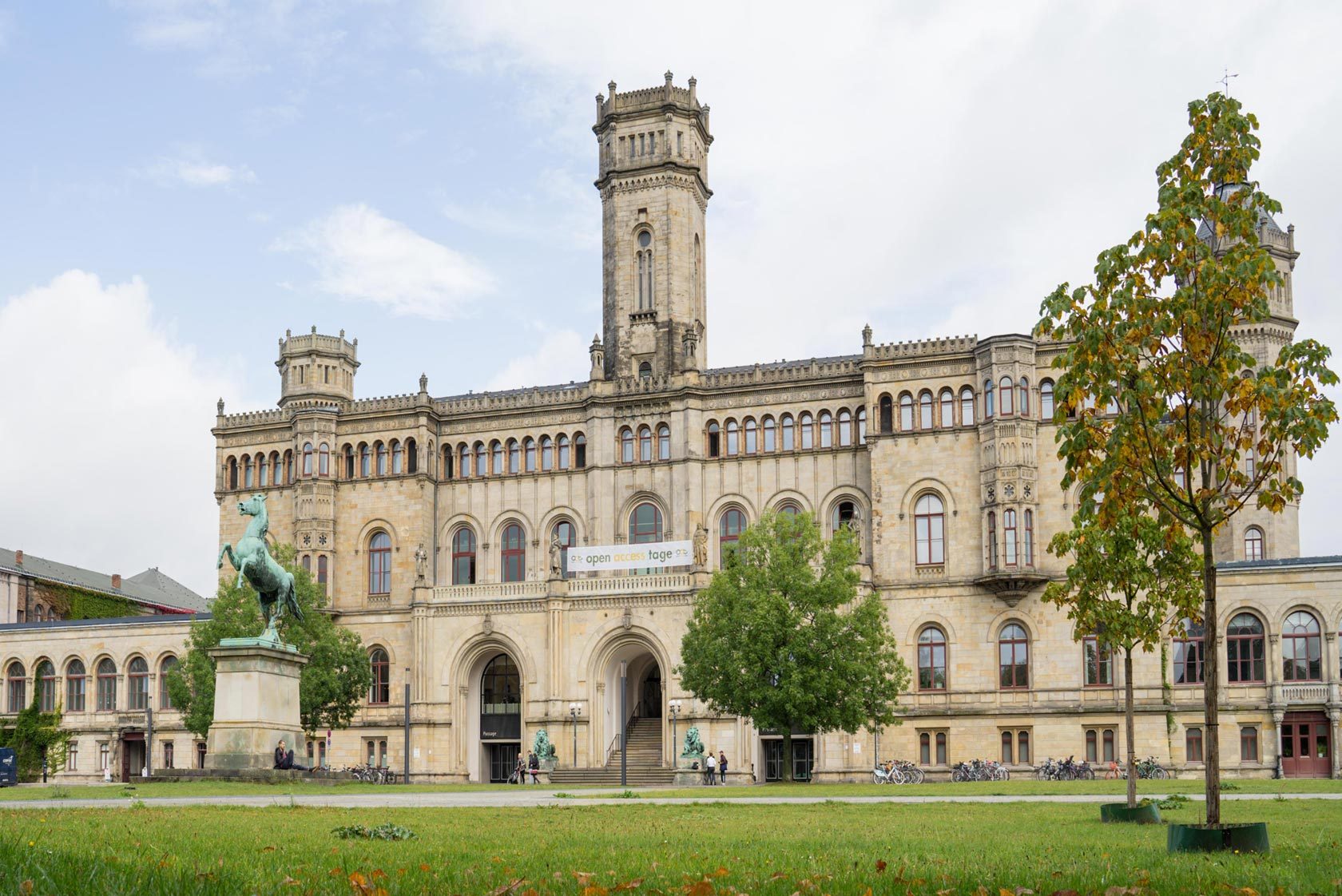
2019 Open Access Days: Business Models and Their Financial Impacts for Open Access Transformation
At the 2019 Open Access Days, business models for open access transformation were one...


